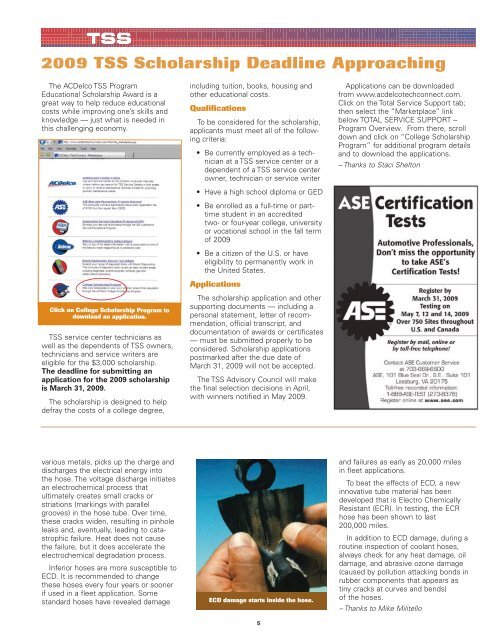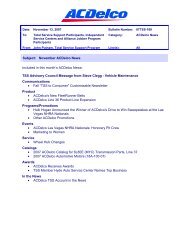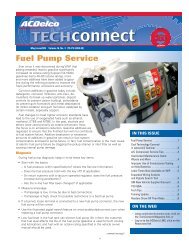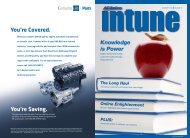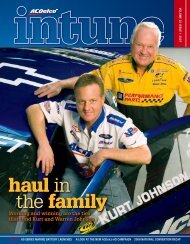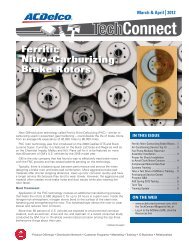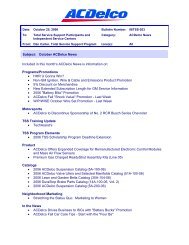Programming Tips and Tools - ACDelco TechConnect
Programming Tips and Tools - ACDelco TechConnect
Programming Tips and Tools - ACDelco TechConnect
Create successful ePaper yourself
Turn your PDF publications into a flip-book with our unique Google optimized e-Paper software.
2009 TSS Scholarship Deadline Approaching<br />
The <strong>ACDelco</strong> TSS Program<br />
Educational Scholarship Award is a<br />
great way to help reduce educational<br />
costs while improving one’s skills <strong>and</strong><br />
knowledge — just what is needed in<br />
this challenging economy.<br />
Click on College Scholarship Program to<br />
download an application.<br />
TSS service center technicians as<br />
well as the dependents of TSS owners,<br />
technicians <strong>and</strong> service writers are<br />
eligible for the $3,000 scholarship.<br />
The deadline for submitting an<br />
application for the 2009 scholarship<br />
is March 31, 2009.<br />
The scholarship is designed to help<br />
defray the costs of a college degree,<br />
various metals, picks up the charge <strong>and</strong><br />
discharges the electrical energy into<br />
the hose. The voltage discharge initiates<br />
an electrochemical process that<br />
ultimately creates small cracks or<br />
striations (markings with parallel<br />
grooves) in the hose tube. Over time,<br />
these cracks widen, resulting in pinhole<br />
leaks <strong>and</strong>, eventually, leading to catastrophic<br />
failure. Heat does not cause<br />
the failure, but it does accelerate the<br />
electro chemical degradation process.<br />
Inferior hoses are more susceptible to<br />
ECD. It is recommended to change<br />
these hoses every four years or sooner<br />
if used in a fleet application. Some<br />
st<strong>and</strong>ard hoses have revealed damage<br />
including tuition, books, housing <strong>and</strong><br />
other educational costs.<br />
Qualifications<br />
To be considered for the scholarship,<br />
applicants must meet all of the following<br />
criteria:<br />
Be currently employed as a tech -<br />
nician at a TSS service center or a<br />
dependent of a TSS service center<br />
owner, technician or service writer<br />
Have a high school diploma or GED<br />
Be enrolled as a full-time or parttime<br />
student in an accredited<br />
two- or four-year college, university<br />
or vocational school in the fall term<br />
of 2009<br />
Be a citizen of the U.S. or have<br />
eligibility to permanently work in<br />
the United States.<br />
Applications<br />
The scholarship application <strong>and</strong> other<br />
supporting documents — including a<br />
personal statement, letter of recom -<br />
mendation, official transcript, <strong>and</strong><br />
documentation of awards or certificates<br />
— must be submitted properly to be<br />
considered. Scholarship applications<br />
postmarked after the due date of<br />
March 31, 2009 will not be accepted.<br />
The TSS Advisory Council will make<br />
the final selection decisions in April,<br />
with winners notified in May 2009.<br />
ECD damage starts inside the hose.<br />
5<br />
Applications can be downloaded<br />
from www.acdelcotechconnect.com.<br />
Click on the Total Service Support tab;<br />
then select the “Marketplace” link<br />
below TOTAL SERVICE SUPPORT –<br />
Program Overview. From there, scroll<br />
down <strong>and</strong> click on “College Scholarship<br />
Program” for additional program details<br />
<strong>and</strong> to download the applications.<br />
– Thanks to Staci Shelton<br />
<strong>and</strong> failures as early as 20,000 miles<br />
in fleet applications.<br />
To beat the effects of ECD, a new<br />
innovative tube material has been<br />
developed that is Electro Chemically<br />
Resistant (ECR). In testing, the ECR<br />
hose has been shown to last<br />
200,000 miles.<br />
In addition to ECD damage, during a<br />
routine inspection of coolant hoses,<br />
always check for any heat damage, oil<br />
damage, <strong>and</strong> abrasive ozone damage<br />
(caused by pollution attacking bonds in<br />
rubber components that appears as<br />
tiny cracks at curves <strong>and</strong> bends)<br />
of the hoses.<br />
– Thanks to Mike Militello


